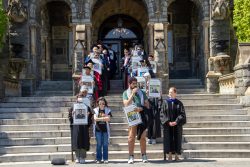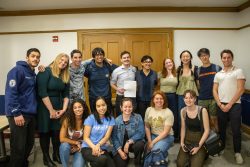The University is crafting new off-campus housing regulations, a process which has close ties to the negotiation of the 2010 Campus Plan. The discussion is still in its early stages, but student leaders at Georgetown have recently attended two meetings with Georgetown administrators to discuss changes to off-campus housing regulations.
The first meeting, in August, was attended by seven students, Vice President of Student Affairs Todd Olson, and Associate Vice President of Student Affairs Jeanne Lord.
Administrators and students spoke about issues such as congestion, trash, and noise that shape student-neighbor relations, according to Ana Alicia Siqueiros (COL ’11), who attended the meeting. Students also raised the issue of neighbors calling 911 for noise violations, and brainstormed solutions to encourage neighbors to call the Student Neighborhood Assistance Program, a service run by the University, instead. Students also talked about positive relationships they had developed with neighbors in the past by introducing themselves to neighbors at the beginning of the year.
The second meeting, a luncheon with several more student attendees, took place in early September after classes started. It was remarkably more structured than the rather open-ended first meeting, according to Siqueiros. Olson and Lord headed this meeting as well.
In the second meeting, the group discussed off-campus party registration, which elicited concern from several students at the meeting. The students were concerned about this possibility and expressed the need for the administration to approach the Campus Plan in a way that did not attack the student body, but rather made students feel that the University is working on their behalf.
Fitz Lufkin (COL’11), who also had attended the first meeting in August, expressed concern that neighbors seemed to be unwilling to compromise on many issues, pointing out that many still call 911 instead of SNAP to report disruptive parties.
“To its credit, the University had done a very good job of trying to convince the neighbors to [use SNAP] … they even had SNAP running through the summer,” Lufkin said. “I can imagine the University would be frustrated that it’s trying to do everything it can to find something that will work for students and neighbors, and then to see some people say, ‘Well forget that, I’m just going to call 911.’”
Lufkin, however, said he came out of the meeting feeling more refreshed than frustrated.
“It was one of those meetings where you went in and felt good when you came out. They actually want our opinion, and they’re asking for our advice,” he said.
Jennifer Altemus (COL ’88), the president of the Citizens Association of Georgetown, also talked about improving town-gown relations too, in an email sent out to the CAG listserv last week.
“If you live near an off-campus student residence, I encourage you to introduce yourself and get to know the students,” Altemus wrote. “Some of the problems we have experienced in the past could possibly be avoided if there are neighborly relationships established early.”
However, the email did go on to recommend those living in West Georgetown call 911 for noise violations.
Georgetown’s Director of Media Relations Andy Pino said in an email that there are no definitive plans for specific policy changes or a set time frame for instating the new regulations, adding that administrators are currently in conversation with students about a range of possibilities.





